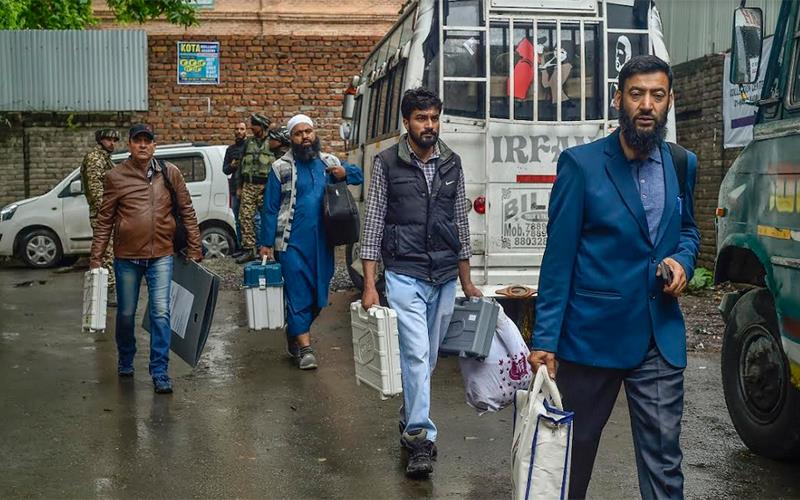Polling in Srinagar LS constituency today: 1st boycott-free polling in Kashmir in 37 years
Ahmed Ali Fayyaz. Updated: 5/13/2024 12:55:55 AM
Front Page

Srinagar: Monday’s polling in the 4th phase of the Lok Sabha elections, in the Srinagar constituency, is significant for a host of reasons: This is the first major democratic exercise after the abrogation of Article 370 and reorganisation of the erstwhile State of Jammu and Kashmir into the two separate Union Territories in 2019.
It will be virtually a referendum on the BJP Government’s radical changes to the Constitution and downsizing of the State to a UT for two reasons: First, the Prime Minister Narendra Modi began seeking 370 seats in this election.
Second, almost all the Kashmir-based parties, notably Farooq Abdullah’s National Conference and Mehbooba Mufti’s Peoples Democratic Party asserted all through their election campaign that “sadak, bijli, pani” were not the issues of their manifesto in the current election. They invariably described the democratic exercise as a “referendum”. Even the Election Commission of India took cognizance and sought a detailed clarification from the PDP’s Srinagar candidate Waheedur Rehman Para who reportedly justified his assertions.
NC’s Aga Ruhullah too has been invariably telling his followers and voters that this election was a referendum on the Centre’s decisions on Jammu and Kashmir in 2019 and thereafter. The NC vice president Omar Abdullah, the party’s candidate in Baramulla, has also used a similar language and posturing during his extensive campaigning.
So, this is the first popularity test to the BJP Government’s historic decisions on Jammu and Kashmir in the last five years as also the first popularity test to the Kashmir-based parties’ converse stand on the abrogation of Article 370, the loss of the special status as well as the loss of the Statehood.
But that is not the only importance of Monday’s polling in Central Kashmir.
The valley of Kashmir has witnessed very low voter turnout in almost all Lok Sabha and Assembly elections after 1987. While the last Lok Sabha elections of a massive participation were held in December 1984, the last Assembly elections of a high turnout happened in March 1987. When the Lok Sabha elections were held in November 1989, the Kashmiris had alienated themselves from the system.
Not a single individual filed nomination papers against the NC’s candidate Mohammad Shafi Bhat who was declared elected unopposed. The voter turnout was the lowest in the history as less than 5 percent voters came out to exercise their right of franchise in Baramulla and Anantnag.
With the eruption of the armed insurgency and a Pakistan-sponsored separatist movement, Farooq Abdullah’s NC-Congress coalition broke down in January 1990. When over six years later, the next Parliamentary and Assembly elections were held in 1996, nobody had a spine to cast a vote.
All the separatist groups and militant organisations called for a total boycott to the elections and enforced their call with guns and grenades. They announced the “reward of a bullet in the forehead” and amputation of the index finger of anybody participating in the elections.
Even the NC chose to stay away from the Lok Sabha elections, though for different reasons. It made clear that the party would participate only after the ‘promised greater autonomy’ was granted to the State. Finally, the NC contested the Assembly elections of 1996 but at most of the places the voters were brought out by the security forces.
In the Lok Sabha elections of 1998 and 1999 and the Assembly elections of 2002, the security forces did not interfere with the polling. However, due to coordinated anti-election campaign by the separatists and threats and killings by the militants, the voter turnout remained dismal. Finally the reasonably good participation elections were held for Assembly in 2008 and 2014 and for Lok Sabha in 2009 and 2014.
Mainly due to the anti-election campaign by separatists and militants, the turnout in the last four Lok Sabha elections (2009, 2014, 2017 and 2019) ranged between a paltry 7 percent and 26 percent in Srinagar, even as it was a little higher in Baramulla and Anantnag.
Admittedly the situation has changed drastically in the last 5 years. A number of the top separatist leaders, including hardliner Syed Ali Shah Geelani, his son-in-law Altaf Fantoosh, Ashraf Sehrai and Maulvi Abbas Ansari died their natural death. Almost all the militant commanders with a large number of their cadres were eliminated in scores of encounters.
For the first time, the State security was withdrawn from the separatist leaders and they were divested of the VVIP status they enjoyed for about 30 years. Most of the militant and separatist organisations were banned and a number of their leaders, including Yasin Malik and Shabir Shah, were arrested, booked in fresh terror cases and detained in the jails outside Jammu and Kashmir.
The BJP Government’s aggressive and repressive tactics achieved the desired results. First the culture of stone pelting, mob attacks on security forces, clashes with Police, funeral processions and gun salutes for the slain militants stopped dramatically. For the first time, the authorities decided to bury the bodies of the slain militants in remote areas of Baramulla and Kupwara and the families and organisations were not allowed to hold any tribute paying events.
Because of this remarkable change, the separatist—some free and some under intermittent house arrest—ceased to issue their conventional boycott calls. This is also for the first time that the remnants of the militants have failed to harm anybody participating in the current elections in Kashmir.
Now it remains to be seen as to how many of the voters exercise their democratic right on Monday. The turnout in Srinagar is likely to impact the situation also in Baramulla and Anantnag.
Updated On 5/13/2024 12:56:53 AM